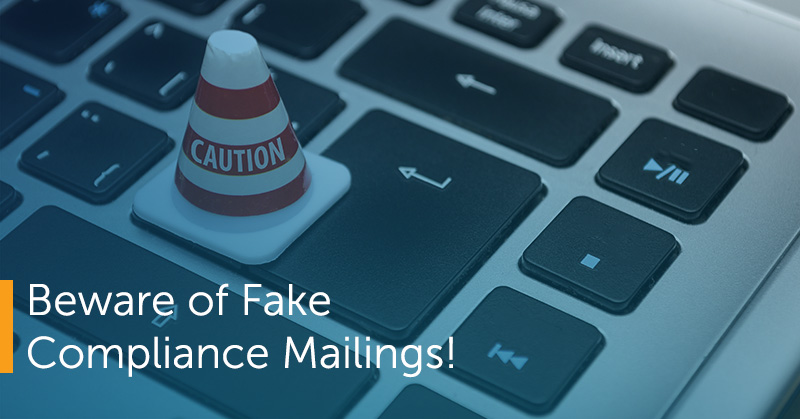-
Software
Compliance Software
Oversee licenses, track renewals, access documents, and more from a single interface.
Software Overview -
Services
Compliance Services
Full service compliance solutions for organizations throughout their entire lifecycles.
Services Overview -
Industries
-
Partner
- Information Center
Beware of Fake Compliance Mailings!

When it comes to government paperwork, everybody’s afraid of getting it wrong. After all, there’s a lot at stake. Being late or submitting incorrect information can land you in serious hot water, and the rules are not exactly easy to decipher.
That anxiety can make organizations easy targets for fake compliance notices. We get calls all the time from clients who are confused by unusual documents they received in the mail. These mailings are designed to look like official government correspondence, often including lengthy excerpts from statutes to add to the effect, but they are not state documents.
Because their creators go to great lengths to make them look official, it can be hard for a non-specialist to tell the difference between scam notices and the real thing. Fortunately, our clients usually just call us when they get these, and we encourage you to do the same. But when in doubt, there are telltale signs you can use to spot an imposter.
Common Scams
Most of the scam mailings we see concern annual reports. They may reference annual reports directly or use similar terms like annual records statement, annual meeting disclosure, annual minutes, or officers list. These are scams because they reference filings that are not due to the state, the sender is not a state agency, and they are passing off hidden contractual agreements and fees as state requirements. We have also seen fake notices regarding registered agent service, trademark renewals, publication requirements, certificates of existence or status, and general business compliance.
Often, the notices contain corporate I.D. numbers and information about your company scraped from state records. They may claim that your filings are overdue and threaten you with late fees, dissolution, and other consequences if you don’t follow the directions. The idea, of course, is to prompt quick action. Instead, take time to examine the letter more closely.
Look at the Envelope
Did the outer envelope have a return address from the state? Often, fake notices are sent with no return address at all. Why would the state send documents in an unmarked envelope?
Now look at the enclosed return envelope. Is it addressed to the secretary of state or other government office, or to a vague corporate name and a P.O. Box? If it’s going back to the state, it will be addressed to a recognizable state official or agency.
Look at the Letterhead
Official state notices and websites bear a state seal or other recognizable branding. Often fake notices try to mimic those insignias, but a quick comparison will show that they are not the same.
Refer Registered Agent Notices to Your Agent
If you get a notice about your registered agent that didn’t come from your agent, it is likely fraudulent. Anytime you’re confused about documents concerning your registered agent, you should give them a call. You should be able to get prompt answers to your questions and clear directions on how to respond. Our registered agent clients always have easy access to their compliance teams.
Look for a Disclaimer
Often service companies will include a disclaimer stating that they are not a government agency, are not affiliated with one, or do not have a contract with one to provide the relevant service. Often these notices will appear in all capital letters. This is an attempt to show that the company is providing fair notice of its intentions, but it is actually a telltale sign of a scam.
Here’s an example from a mailing we recently received from a concerned client.

In this case, the scammers are trying to make the target unwittingly sign up for services that are neither wanted nor required, all in exchange for hefty fees.
Here’s another example from Florida:

Verify Through State Websites
People sending these mailings usually send them out in droves, so if you received one, chances are many others are puzzling over the very same document right now. A quick web search may reveal the scam for what it is. You can also check your secretary of state’s website to see if there are any warnings regarding similar notices. Most state websites feature numerous examples of fraudulent compliance mailings to look out for. You can also send your document to the state for investigation.
Call the Experts
When it comes to state filings, real and fake, our compliance specialists have truly seen it all. Whenever you have questions, doubts, or anxieties about getting it wrong, they can step in to steer you in the right direction. Just get in touch or give us a call, 1-888-995-5895. We’re excited to work with you!



